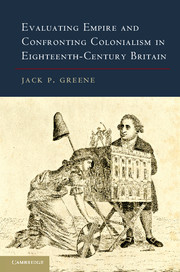Book contents
- Frontmatter
- Contents
- Preface Confronting Empire
- Prologue “Scene of a Foul Transaction”
- 1 “The Principal Cornucopia of Great-Britain's Wealth”
- 2 Outposts of “Loose Vagrant People”
- 3 “A Fabric at Once the Dread and Wonder of the World”
- 4 Arenas of “Asiatic Plunder”
- 5 Sites of Creolean Despotism
- 6 “A Fruitless, Bloody, Wasting War”
- 7 “This Voraginous Gulph of Hibernian Dependence”
- 8 A “Shadow of Our Former Glory”?
- Epilogue “Against Every Principle of Justice, Humanity, and Whatever is Allowed to be Right Among Mankind”
- Index
- References
Epilogue - “Against Every Principle of Justice, Humanity, and Whatever is Allowed to be Right Among Mankind”
Standards of Humanity and the Evaluation of Empire
Published online by Cambridge University Press: 05 June 2013
- Frontmatter
- Contents
- Preface Confronting Empire
- Prologue “Scene of a Foul Transaction”
- 1 “The Principal Cornucopia of Great-Britain's Wealth”
- 2 Outposts of “Loose Vagrant People”
- 3 “A Fabric at Once the Dread and Wonder of the World”
- 4 Arenas of “Asiatic Plunder”
- 5 Sites of Creolean Despotism
- 6 “A Fruitless, Bloody, Wasting War”
- 7 “This Voraginous Gulph of Hibernian Dependence”
- 8 A “Shadow of Our Former Glory”?
- Epilogue “Against Every Principle of Justice, Humanity, and Whatever is Allowed to be Right Among Mankind”
- Index
- References
Summary
During the quarter-century following the conclusion of the Seven Years’ War in 1763, the discussion of empire in Britain took a new turn. Metropolitan Britons were accustomed to celebrating the British Empire as an engine for the growth of Britain's commerce, wealth, and maritime power, an arena for the extension of British liberty, improvement, and civility, an outlet for individual ambition, and a site for the displacement – and possible redemption – of metropolitan undesirables. Up to 1763, the languages of commerce, maritime power, liberty, improvement, and civility had been sufficient for metropolitan Britons to express their generally favorable assessment of empire, and the language of alterity, to express their skepticism about those who peopled and presided over those societies and their claims to a British identity. In the wake of Britain's extraordinary and worldwide victory in the Seven Years’ War, metropolitans added a language of imperial grandeur to their repertoire.
Very quickly after the peace, however, a series of developments throughout the empire exposed the tensions among these conventional languages of empire and raised questions about whether they were adequate to tell the full story of Britain's imperial achievement. While the controversy with the American colonies over their status within the empire brought out the latent contradictions between the languages of commerce and liberty, on the one hand, and that of imperial grandeur, on the other, ongoing revelations about the rapacity of East India Company servants; increasingly strident protests against the systems of enslavement entrenched in many American colonies, the iniquities of the African slave trade, and those who benefitted from them both; opposition to the Carib War in St. Vincent, and a new consciousness that Britain's imperial successes in Ireland and America had been at the expense of indigenous people; full revelations during the late 1770s and early 1780s of Britain's long-standing economic and political oppression of Ireland; a growing public condemnation of the Protestant persecution of Irish Catholics; and persistent Opposition charges of British inhumanity toward American rebels during the American war – all seemed to demand a new lexicon for speaking about empire.
- Type
- Chapter
- Information
- Publisher: Cambridge University PressPrint publication year: 2013



